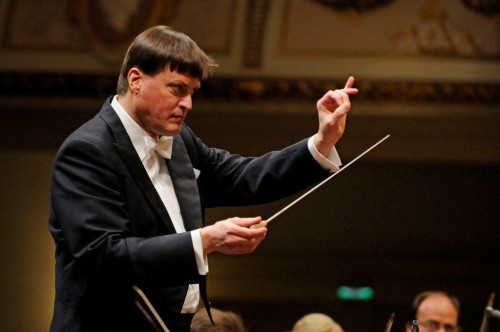 Switzerland Lucerne Festival (2): Eisler Bruckner, Sächsische Staatskapelle Dresden, Christian Thielemann (conductor), Thomas Hampson (baritone) Kultur- und Kongresszentrum Lucerne 5.9.2012
Switzerland Lucerne Festival (2): Eisler Bruckner, Sächsische Staatskapelle Dresden, Christian Thielemann (conductor), Thomas Hampson (baritone) Kultur- und Kongresszentrum Lucerne 5.9.2012

copyright Matthias Creutziger
Eisler: Ernste Gesänge“ (Serious songs)
Bruckner: Symphony No. 5
Hanns Eisler will probably not be a name known to many. He was a Berlin Jew, a friend of Berthold Brecht, an ardent Communist and a pupil of Schönberg. During the War he exiled himself to Mexico and the States and just about maintained his existence with film music, before eventually returning to East Germany. His “Serious Songs” were his last work, written in 1961; he died just a few weeks after their composition was complete. The songs are compiled from different periods throughout his musical career, with different levels of 12-tone atonality. They are surprisingly friendly to the ear although the singer is instructed not to sing them too lyrically but deliver them as though reading from a Baedeker Guide (the standard German tourist guide). Thankfully Thomas Hampson did not take that instruction too literally and gave a warm almost emotional account of these fascinating songs; his diction and intonation always perfect, his voice still firm and honeyed: only the very top of the register now lacks resonance. The songs are linked by gentle pessimism, half of them based on poems by Friedrich Hölderlin. When questioned about the songs, Eisler commented “One cannot always write optimistic songs. Firstly, that would be extremely boring and secondly, it’s not reality.” The last song entitled “Epilog” was the most beautiful, with shades of Richard Strauss; at the end of the work Thielemann obviously agreed and they repeated the last song as an encore, telling the audience that the music being fairly unknown deserves a generous hearing – he was right.
Thielemann’s repertoire currently encompasses the four composers most associated with late Austro-Germanic Romanticism: Brahms, Wagner, Richard Strauss and Bruckner. There is no doubt that Thielemann has an impeccable grasp of the work’s architecture, but critics have been divided over recent years on his interpretations of Bruckner and this performance also left me a mite lukewarm. At 82 minutes it is slow (other sprightly conductors can get through the work in 70 minutes), conjuring up memories of Celibidache’s Bruckner. The slow movement in fact was par for the course on timing, but in the outer movements in particular the work was dragged out from time to time. Admittedly this gave the work a sense of spaciousness, with micromanagement rather than theatricality to highlight some interesting details; but the effect was to make my mind, at least, wander off. This symphony is not one of Bruckner’s greatest; it has been described as dreary, and does not lend itself to much detailed dissection.
The orchestra, with its impressive Bruckner heritage (Böhm, Jochum, Sinopoli) followed their chief conductor’s every instruction to the letter and the sound had ample central European warmth; I was particularly taken with the celli and double basses, and in the brass section the trombones. There were however some glitches and the gear changes led to some lapses in ensemble.
In the Scherzo and Finale, the faster sections were played very fast indeed with massive power when summoned (even without utilizing the extra brass which Karajan employed), the final coda was thrilling, the throaty brass making sure of an enthusiastic reception.
John Rhodes